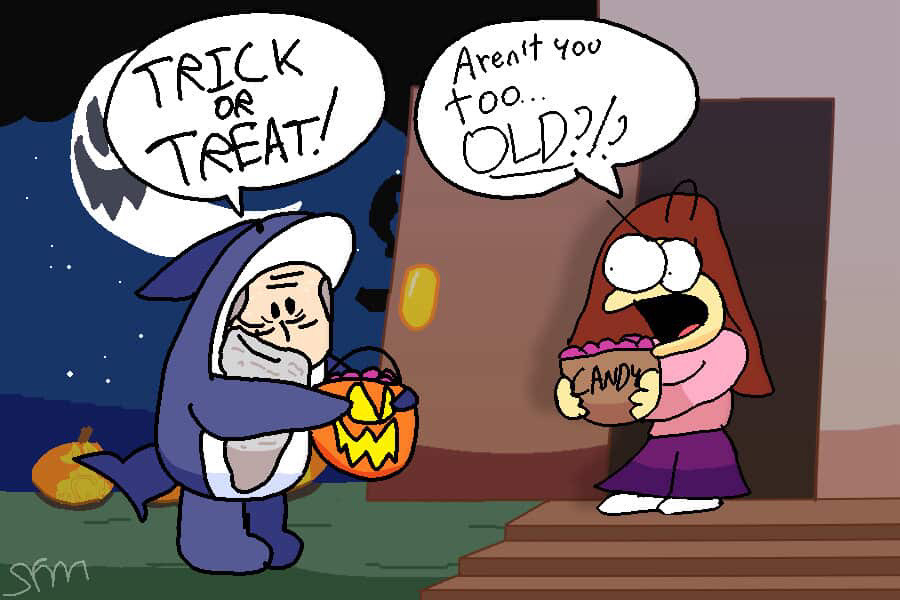For the average band student, the end of marching season is a harbinger for the dismal road ahead. It is a return to the daily routine of high school and the monotonous drone of reality. Beyond the fast paced life of marching season, a slow return to “normal life” is a painful experience. The days of lost sleep, limited personal and social lives, the pile-up of homework, and the development of a “band family” all contribute to a band nerd’s unwillingness to move on. Deprivation can have damaging effects on the psyche. Separation from such a highly invested, time-consuming activity drives many to develop a dangerous and volatile addiction.
The path to marching band addiction follows the many tragic storylines of dependence. First there is initial experimentation (eighth grade night/ summer band); abuse (fall marching season); and most unfortunately, addiction (the complete devotion of life to band activity). If you started reading this article because the words “marching band” made a prominent appearance, then this program is for you.
Step 1-Admittance: Admit to yourself and everyone you know that you have a serious problem. Acknowledging your dependence on marching band will weaken the hold of this “casual addiction.” While thinking that the love of such a wonderful past time is hurting no one, this thought couldn’t be further from the truth. The endless discussions concerning band activities are proven to numb the minds of all people in the vicinity. The draining of parental funds, due to a constant need for band paraphernalia, is also highly detrimental to the economical health of others.
Step 2-Intervention: Deciding to do something about a marching band addiction. “My addiction is unhealthy. Marching band is not the only thing in life. I can move on.” The words are difficult to swallow but they are the gateway to a lifetime of independence. You have a problem and it needs to be addressed now, if not sooner. The faster this dilemma is resolved, the faster you can become an actual asset to society and less of a band-oriented black mark on the face of it.
Step 3-Asking for Help: Asking for help out of your personal darkness does not make you weak. Withdrawal is a difficult and trying time; having a friend to depend on can help you resist cravings and moments of weakness. Backsliding is successfully curtailed when a stringent, severe, personality is riding you at every turn. A swift kick to any major body part is an amazing healing “tool” for the relapse prone and healing challenged. This type of therapy is, of course, impossible without some sort of friendly assistance so get your more violent friends involved (through preferably not the ones in your band family).
Step 4-Making Amends: Apologize to all of the people you’ve hurt, maimed, enraged, and annoyed because of your vice. The ones you love deserve the same care and attention you have foolishly dedicated to a seasonal activity. A constant need for rides at ridiculous hours of the day and night; a substantial drain on the fiscal well-being of your family; and of course, a gratuitous amount of irritating band talk, debating about music, technique and various other band-nerdy stuff, and the basic marching madness following the experience of a marching season. Your annoyingness demands an immediate apology. Beg for forgiveness!
Step 5-New Beginnings: Involve yourself in activities outside of the marching band. These cannot include anything dealing with the viewing or general enjoyment of any forms of band related goodness; try a real sport for a change. Some much needed athletic activity on your part can open the mind to all sorts of possibilities. Join a club, talk to your family, do your homework in a timely manner; these are excellent uses for all of the free time opening up. Since marching band is over for the year, invest your time in more worthwhile things. Being an actual asset to society can be fun.
Step 6-Redemption: Set yourself free from the cold claws of the marching band vice. Live without the degrading label of band-nerd. No longer will you feel the compulsive need to walk in time with people around you, to dress lines that you stand in, or find key changes and time signatures in music on the radio. You can now stop calling the band hall home, and for once, pay to get into a football game. Learn the lyrics to the thousands of stand-tunes you’ve played, and, maybe even stop sitting at the “band table” in the cafeteria.
Step 7-Awakening: Spread the word of your miracle to others in the band community and challenge the established order of the marching world. More importantly, stay clean. Marching band is a cunning temptress and it is impossibly easy to fall into her clutches. Avoid other band children until you are sure you can discuss topics outside the realm of band. The patterns of initial intoxication, tolerance, and dependence develop all too rapidly in the marching band deprived. Explore all of the fascinating opportunities high school has to offer and revel in your cured addiction (at least until next marching season).
Used to their highest potential, these easy steps can move even the most devoted of band followers into the bright lights of salvation. Although the outcome is never guaranteed, the simple presentation of self-help advice may be enough to shock the systems of band members into analyzing their destructive behaviors. Hopefully, society can finally be rid of the annoying and ever-present marching band addicts, and we can all finally rest our aching ears.






![Senior Jett Mckinney stores all the clothes in his own room, with half of it stored in his closet along with his personal clothes, and the rest taking up space in his room.
“There’s been times [when] there’s so much clothing stored here and it gets overwhelming, so I end up having to sleep somewhere else in the house,” Mckinney said.](https://cphswolfpack.com/wp-content/uploads/2025/11/DSC_0951-1200x800.jpg)



![Broadcast, yearbook and newspaper combined for 66 Interscholastic League Press Conference awards this year. Yearbook won 43, newspaper won 14 and broadcast took home nine. “I think [the ILPC awards] are a great way to give the kids some acknowledgement for all of their hard work,” newspaper and yearbook adviser Paige Hert said. “They typically spend the year covering everyone else’s big moments, so it’s really cool for them to be celebrated so many times and in so many different ways.”](https://cphswolfpack.com/wp-content/uploads/2025/05/edited-ILPC.jpg)




![Looking down at his racket, junior Hasun Nguyen hits the green tennis ball. Hasun has played tennis since he was 9 years old, and he is on the varsity team. "I feel like it’s not really appreciated in America as much, but [tennis] is a really competitive and mentally challenging sport,” Nguyen said. “I’m really level-headed and can keep my cool during a match, and that helps me play a bit better under pressure.” Photo by Kyra Cox](https://cphswolfpack.com/wp-content/uploads/2025/09/hasun.jpg)

![Bringing her arm over her head and taking a quick breath, junior Lauren Lucas swims the final laps of the 500 freestyle at the regionals swimming competition on date. Lucas broke the school’s 18-year-old record for the 500 freestyle at regionals and again at state with a time of 4:58.63. “I’d had my eye on that 500 record since my freshman year, so I was really excited to see if I could get it at regionals or districts,” Lucas said. “ State is always a really fun experience and medaling for the first time was really great. It was a very very tight race, [so] I was a bit surprised [that I medaled]. [There were] a lot of fast girls at the meet in general, [and] it was like a dogfight back and forth, back and forth.” Photo by Kaydence Wilkinson](https://cphswolfpack.com/wp-content/uploads/2025/03/Kaydence-2.7-23-edit-2.jpg)


![As her hair blows in the wind, senior Brianna Grandow runs the varsity girls 5K at the cross country district meet last Thursday. Grandow finished fourth in the event and led the varsity girls to regionals with a third place placement as a team. “I’m very excited [to go to regionals],” Grandow said. “I’m excited to race in Corpus Christi, and we get to go to the beach, so that’s really awesome.” Photo by Addison Bruce](https://cphswolfpack.com/wp-content/uploads/2025/10/brianna.jpg)















